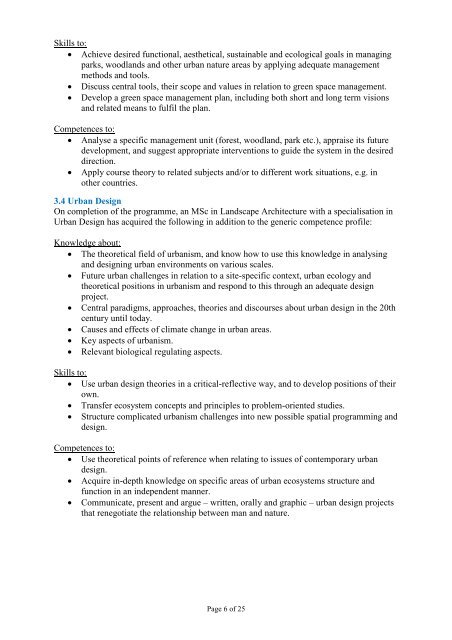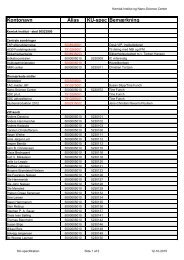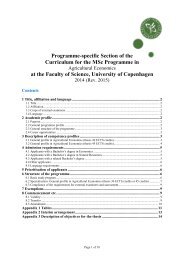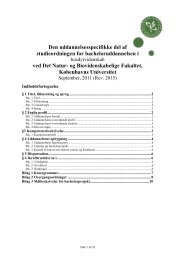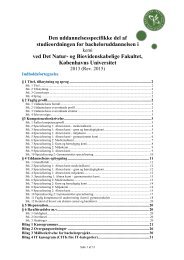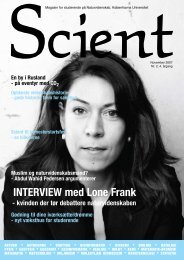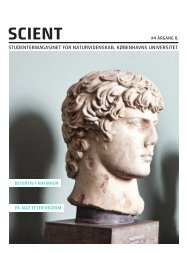Curriculum for MSc in Landscape Architecture - Det Natur ...
Curriculum for MSc in Landscape Architecture - Det Natur ...
Curriculum for MSc in Landscape Architecture - Det Natur ...
You also want an ePaper? Increase the reach of your titles
YUMPU automatically turns print PDFs into web optimized ePapers that Google loves.
Skills to:<br />
Achieve desired functional, aesthetical, susta<strong>in</strong>able and ecological goals <strong>in</strong> manag<strong>in</strong>g<br />
parks, woodlands and other urban nature areas by apply<strong>in</strong>g adequate management<br />
methods and tools.<br />
Discuss central tools, their scope and values <strong>in</strong> relation to green space management.<br />
Develop a green space management plan, <strong>in</strong>clud<strong>in</strong>g both short and long term visions<br />
and related means to fulfil the plan.<br />
Competences to:<br />
Analyse a specific management unit (<strong>for</strong>est, woodland, park etc.), appraise its future<br />
development, and suggest appropriate <strong>in</strong>terventions to guide the system <strong>in</strong> the desired<br />
direction.<br />
Apply course theory to related subjects and/or to different work situations, e.g. <strong>in</strong><br />
other countries.<br />
3.4 Urban Design<br />
On completion of the programme, an <strong>MSc</strong> <strong>in</strong> <strong>Landscape</strong> <strong>Architecture</strong> with a specialisation <strong>in</strong><br />
Urban Design has acquired the follow<strong>in</strong>g <strong>in</strong> addition to the generic competence profile:<br />
Knowledge about:<br />
The theoretical field of urbanism, and know how to use this knowledge <strong>in</strong> analys<strong>in</strong>g<br />
and design<strong>in</strong>g urban environments on various scales.<br />
Future urban challenges <strong>in</strong> relation to a site-specific context, urban ecology and<br />
theoretical positions <strong>in</strong> urbanism and respond to this through an adequate design<br />
project.<br />
Central paradigms, approaches, theories and discourses about urban design <strong>in</strong> the 20th<br />
century until today.<br />
Causes and effects of climate change <strong>in</strong> urban areas.<br />
Key aspects of urbanism.<br />
Relevant biological regulat<strong>in</strong>g aspects.<br />
Skills to:<br />
Use urban design theories <strong>in</strong> a critical-reflective way, and to develop positions of their<br />
own.<br />
Transfer ecosystem concepts and pr<strong>in</strong>ciples to problem-oriented studies.<br />
Structure complicated urbanism challenges <strong>in</strong>to new possible spatial programm<strong>in</strong>g and<br />
design.<br />
Competences to:<br />
Use theoretical po<strong>in</strong>ts of reference when relat<strong>in</strong>g to issues of contemporary urban<br />
design.<br />
Acquire <strong>in</strong>-depth knowledge on specific areas of urban ecosystems structure and<br />
function <strong>in</strong> an <strong>in</strong>dependent manner.<br />
Communicate, present and argue – written, orally and graphic – urban design projects<br />
that renegotiate the relationship between man and nature.<br />
Page 6 of 25


